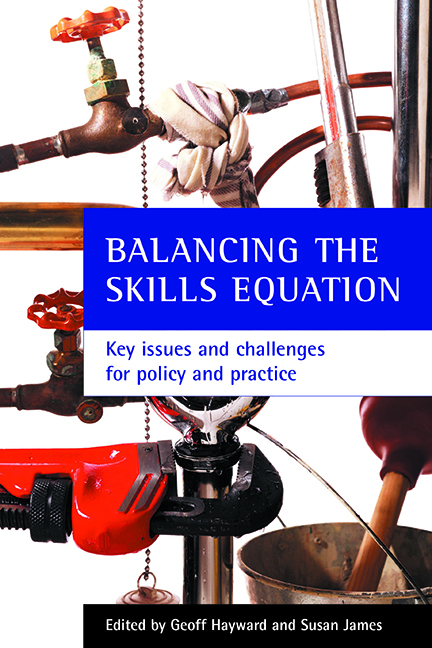Book contents
- Frontmatter
- Contents
- Acknowledgements
- Preface
- Notes on contributors
- one Producing skills: conundrums and possibilities
- two Fit for purpose? Sixty years of VET policy in England
- three The European policy regarding education and training: a critical assessment
- four ‘I can’t believe it’s not skill’: the changing meaning of skill in the UK context and some implications
- five Qualifying for a job: an educational and economic audit of the English 14-19 education and training system
- six Does apprenticeship still have meaning in the UK? The consequences of voluntarism and sectoral change
- seven Tradition and reform: modernising the German dual system of vocational education
- eight Learning in the workplace: reappraisals and reconceptions
- nine Interests, arguments and ideologies: employers’ involvement in education–business partnerships in the US and the UK
- ten Compatible higher education systems and the European labour market: Bologna and beyond
- eleven The expansion of higher education: economic necessity or hyperinflation?
- twelve Becoming a chef: the politics and culture of learning
- Index
- Also available from The Policy Press
nine - Interests, arguments and ideologies: employers’ involvement in education–business partnerships in the US and the UK
Published online by Cambridge University Press: 20 January 2022
- Frontmatter
- Contents
- Acknowledgements
- Preface
- Notes on contributors
- one Producing skills: conundrums and possibilities
- two Fit for purpose? Sixty years of VET policy in England
- three The European policy regarding education and training: a critical assessment
- four ‘I can’t believe it’s not skill’: the changing meaning of skill in the UK context and some implications
- five Qualifying for a job: an educational and economic audit of the English 14-19 education and training system
- six Does apprenticeship still have meaning in the UK? The consequences of voluntarism and sectoral change
- seven Tradition and reform: modernising the German dual system of vocational education
- eight Learning in the workplace: reappraisals and reconceptions
- nine Interests, arguments and ideologies: employers’ involvement in education–business partnerships in the US and the UK
- ten Compatible higher education systems and the European labour market: Bologna and beyond
- eleven The expansion of higher education: economic necessity or hyperinflation?
- twelve Becoming a chef: the politics and culture of learning
- Index
- Also available from The Policy Press
Summary
Introduction
From corporate level political and philanthropic support to ground-level mentoring, tutoring and curriculum design, the education–business relationship reflects a complex amalgam of employment interests, competitiveness arguments and stakeholder ideologies. However, this increasingly powerful collaboration, which appears to have permeated international, national, district and site level education policy, yields questionable results and uncritical examination of school community impact and learning outcomes for all partnership participants. This chapter examines the added value of employers in the context of education– business partnerships by drawing upon the literature, including a comparative study based on survey, interview and observation data gathered in secondary schools within the US and the UK during the 1997-98 academic year.
In search of added value
Ongoing debates on partnerships’ added value incorporate arguments of educational purpose and employability of graduates. While some employers view partnerships as a means towards preparing future workers in an increasingly competitive global marketplace (McMullen and Snyder, 1987), educators often look to these collaborations for critical resource and network support. Even though some partnership agendas promote student success as their objectives, the challenge remains to define, operate and substantiate this measure of success in terms which are meaningful to all partnership interests. Negotiating among these different interests poses additional challenges, and reveals inherent conflicts of interests, ideologies and arguments for educational provision. Most likely, the initial reasons for partnership formation are the very ones that should influence and incorporate the ultimate student outcomes that will measure partnership success or failure:
There are many reasons for developing school, family and community partnerships. They can improve school programs and school climate, provide family services and support, increase parents’ skills and leadership, connect families with others in the schools and in the community, and help teachers with their work. However, the main reason to create such partnerships is to help all youngsters succeed in school and in later life. When parents, teachers, students, and others view one another as partners in education, a caring community forms around students and begins to work. (Epstein, 1995, p 707)
The multiple layers of interests that partnerships reveal, in one sense, draw attention to what is missing in publicly supported institutions.
- Type
- Chapter
- Information
- Balancing the Skills EquationKey Issues and Challenges for Policy and Practice, pp. 171 - 186Publisher: Bristol University PressPrint publication year: 2004

